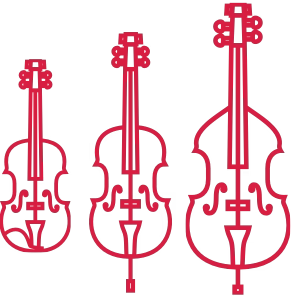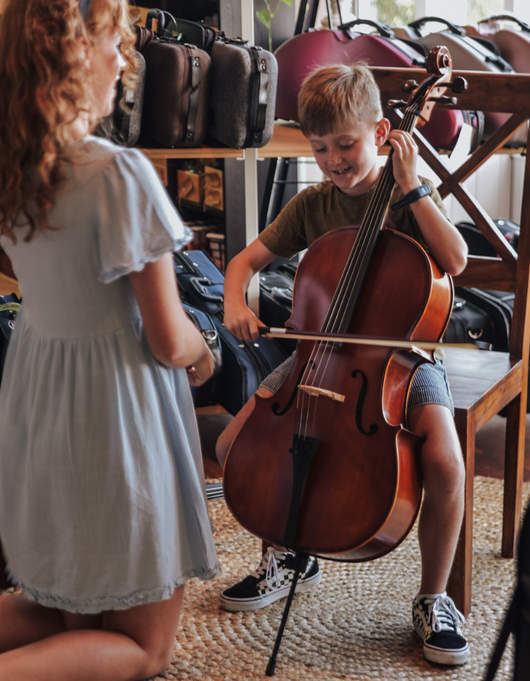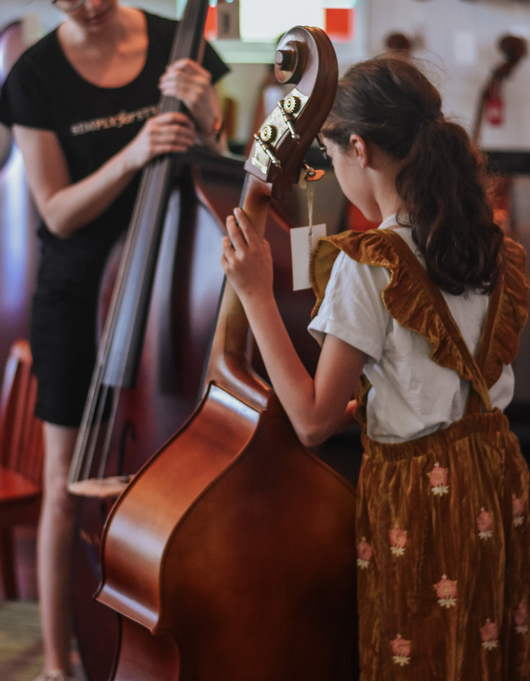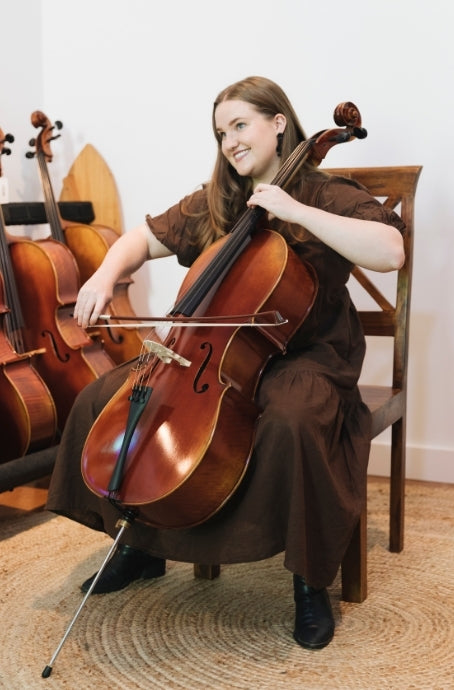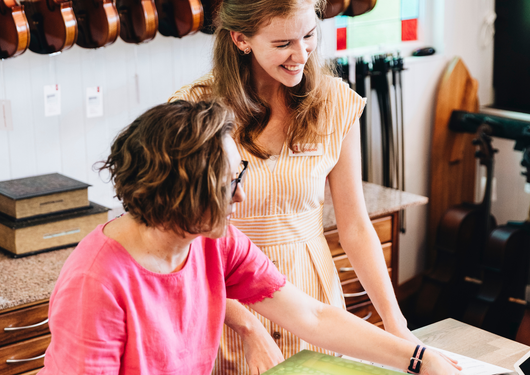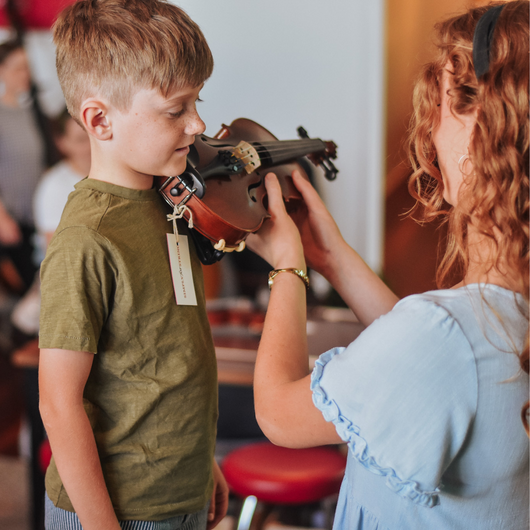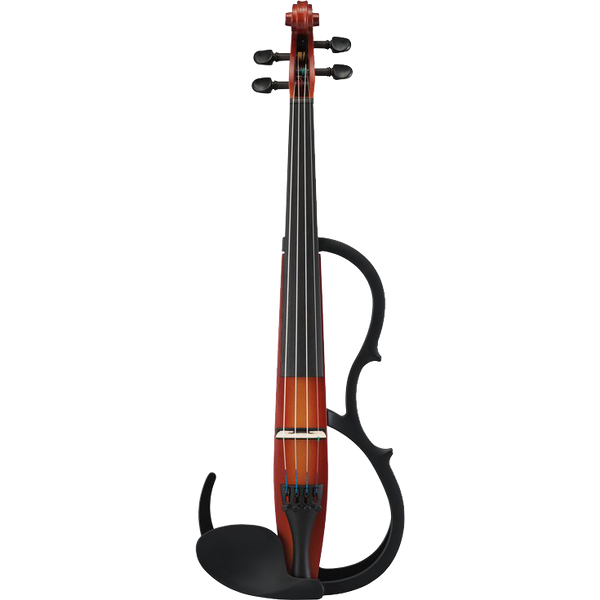The SV250/255 is designed to meet the needs of the professional and high-class amateur performer wanting amplified violin sound for all sorts of music. This violin establishes a new benchmark for sound quality and player comfort. With its weight of only around 500g, it has the same weight as a traditional acoustic violin. The violinist can easily convert from his current acoustic to our new Silent Violin™.
A new benchmark in professional performance for electric violin
- New body design: hollow resonating chamber
- Spruce top/flamed Maple back
- Double pickups: bridge pickup, body pickup & ‘blend’
- Control Box with input, output & XLR balance, phones
- Volume, treble/bass, phones volume control
- Shaded brown finish
The innovative dual pick up system allows the performer to a blend the tone quality from edgy electric to a rich acoustic sound. The external control box contains a powerful pre-amp, master volume control, treble and bass tone controls, as well as quarter-inch and XLR balanced outputs. Both models are crafted from seasoned flamed maple, spruce top and fit with ebony pegs, fingerboard.
Two Pickup Types Add Up to Expressive Freedom
Yamaha’s acclaimed body pickup faithfully captures the rich resonance of the instrument’s entire body, as well as vibrato and other performance nuances.A second newly developed bridge pickup directly captures string vibration so that attack and bowing subtleties are accurately reproduced as well. A pickup blend control allows optimum balance between pickups.
Dedicated Control Box Offers Easy Control and Connectivity
The dedicated control box offers easily accessible volume and two-band tone control, clipped to the player’s belt or to another convenient location. It also features a headphone monitor output with independent volume control. In addition to a line out jack that’s suitable for sending the SILENT Violin™ signal to an amplifier or effect unit, a balanced XLR type output is provided for direct, high-quality connection to professional sound reinforcement and recording equipment.
New Body Design Achieves Natural Sound and Playability
The “Acoustic Hollow Body Design” so highly regarded in the SVC110 SILENT Cello™ and SLB200 SILENT Bass™ has been adapted and optimized for refined violin sound and playability in the SV250 and SV255. The result is a deep resonance that is remarkably close to acoustic violins in quality, as well as a familiar, intimate playing feel. An exquisite shaded finish brings out the beauty of the natural wood grain.
Acoustic Violin Weight and Balance
At 500 and 540 grams, respectively, the 4-string SV250 and 5-string SV255 are about the same weight as many of their acoustic counterparts. Furthermore, the tailpiece, neck, and tuning pegs on both models are exactly the same as those used on acoustic violins. Precision construction and meticulous attention to every detail mean total satisfaction for the most discerning player. Most standard shoulder rests can be used.


Sound Profile
Find your sound! Quickly identify the different tonal characteristics of each instrument brand and model. Our Sound Profile can help you find the type of voice you’re seeking, whether the instrument range is beginner, intermediate or beyond. We gathered six string players and teachers to blindly listen to each instrument and develop our unique and comprehensive Sound Profile. Learn More about Sound Profiles.
| Body: | Spruce/Maple |
| Frame: | Plastic |
| Neck: | Maple |
| Finish: | Black |
| Pegs: | Ebony - finished and fitted by hand |
| Fingerboard: | Composite |
| Tailpiece: | Wittner Ultralight-weight with inbuilt fine tuners |
| Chinrest: | Plastic |
| Bridge: | Aubert with Piezo Pickup - hand-carved and fitted |
| Strings: | D'Addario Zyex |
| Grade: | Beginner to intermediate students |
| Pickup/Controls: | Built-in Piezo Pickup Body and Bridge, Line Out Volume, Treble, Bass, Headphone Volume, Ground Lift Switch, Balanced Out, PAD Switch |
| Inclusions: | Instrument Only. Control Box, Connection Cable, Cable Bands, Earphone, AA Size 1.5V Battery 2pcs |
| Country of Origin: | Handmade in China. Finished & Set Up in Australia. |
At Simply for Strings, our luthiers and staff ensure that each instrument is individually assembled, setup, tuned, and inspected to our highest standards. Your instrument will be ready to play when you receive it—not sent to you unstrung or in pieces as sold by other online suppliers.

OUR SET UP INCLUDES:
- Shaping and re-surfacing the fingerboard
- Carving and fitting the bridge to the instrument
- Carving the nut to professional curvature
- Fitting pegs
- Polishing the finish
- Installing strings and tuning the instrument
- Fitting and adjusting the sound post
- Fitting and adjusting the tailpiece
- Inspecting and pre-rosining the bow

SHIPPING
- We work hard on processing and delivering your order as quickly as we can! We’re pleased to offer free standard shipping on all orders over $99* Australia wide.
- We aim for all of our parcels to have a safe delivery and we keep you updated every step of the way.
- All of our orders are packed in 100% eco-friendly packaging.
- Every single order is checked and packed by professional musicians who understand the nuances of every product we sell.
- Express shipping and click & collect services available. For more information on Shipping & Returns, please click here.
RETURNS
- Happiness guaranteed, no-nonsense returns.
- 30 days to change your mind! 3 easy steps to request a return through our portal. Just let us know what items you want to return, print a return label and pack your items.
- Easy exchanges available to help you find the product that’s perfect for you.
- Simply for Strings acknowledges and upholds all guidelines and terms under The Australian Consumer Law (ACCC). For more information on Shipping & Returns, please click here.

Packaged with Care
Trust us! We ship more instruments than anyone else in Australia.
Any unlikely damages during shipping are covered by us. Delivery day is special when you receive a Simply for Strings parcel. All of our orders are packed by our team of musicians in 100% eco-friendly packaging. Investing in an instrument is a big deal - our instruments are carefully bubble wrapped and packed in custom boxes to minimise movement during transit. If anything is damaged upon arrival, we’ll sort it in a jiffy! Whether you're ordering a new set of strings or a delicate musical instrument, every single order is packaged and sent with care. READ MORE
Why Simply for Strings

